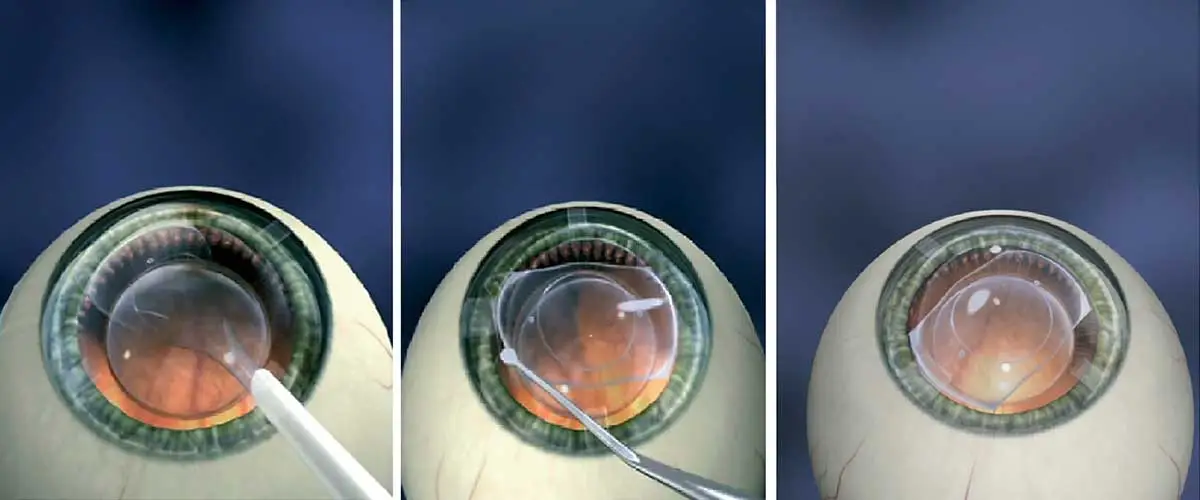For patients who do not wish to wear glasses or contact lenses, laser eye surgeries are the first treatment option preferred by eye doctors around the world. However, for individuals whose eye structure is not suitable for laser surgery or whose refractive errors are too high to be corrected with laser, ICL (Phakic Intraocular Lens) treatment is applied. The most commonly preferred ICL lens is the Visian ICL.
Phakic intraocular lens surgery, commonly known as ICL (Implantable Collamer Lens), is a refractive surgical method used to correct vision problems. It offers an effective solution for people with myopia, hyperopia, or astigmatism who do not wish to use glasses or contact lenses. ICL is an artificial lens implanted into the eye, positioned in front of the natural lens, to correct refractive errors.
ICL treatment is performed as an outpatient procedure, without the need for hospital admission. ICL lenses are implanted one eye at a time, typically with a one-day interval, and the patient can return to daily life as early as the day after surgery. The procedure takes approximately 10 minutes and can be performed under sedation. Patients do not experience any pain or discomfort during the operation.
What Is a Phakic Intraocular Lens (ICL)?
Phakic intraocular lenses are thin, flexible, and biocompatible lenses placed in the anterior chamber of the eye without removing the eye’s natural lens. These lenses work together with the natural lens to provide sharp and clear vision. ICL lenses are made of a special biocompatible material called Collamer, which adapts seamlessly to the eye and minimizes side effects.
Who Is Suitable for ICL?
ICL surgery is an ideal alternative especially for those who are not suitable for laser eye surgery (LASIK or PRK). Candidates for ICL include:
High Myopia, Hyperopia, and Astigmatism
Patients with high refractive errors who are not eligible for laser correction. ICL can correct myopia up to -18 diopters, astigmatism up to 6 diopters, and hyperopia up to 10 diopters, for patients over 18 years old.
Thin Cornea
Patients whose corneal thickness is insufficient for laser procedures. The ICL is placed between the iris and the natural lens. The anterior chamber depth should be greater than 2.8 mm.
Dry Eye Issues
People who have difficulty wearing contact lenses or suffer from chronic dry eye. Patients must not have other eye diseases such as uveitis, cataracts, or glaucoma.
Desire for High Visual Quality
ICL lenses offer high-definition vision and are especially beneficial for those who demand superior visual clarity.
What Are the Advantages of ICL Surgery?
Permanent Vision Correction
ICL lenses provide permanent correction of refractive errors without causing dry eyes, unlike laser surgery. They are suitable for very high prescriptions that cannot be corrected with laser.
Reversible Procedure
A major advantage of ICL is that it is reversible. The lens can be removed or replaced if necessary, making the procedure safe and flexible. In case of any complications related to the lens, it can be easily taken out.
Wide Field of Vision
Compared to laser treatments, ICL lenses offer a broader field of vision and better performance in low-light conditions such as night driving. Some patients even report better vision than they had with glasses.
No Damage to the Cornea
ICL surgery does not thin or reshape the corneal tissue and thus does not damage the cornea. It is ideal for patients with thin corneas who are not candidates for laser surgery.
Are There Any Risks of ICL Surgery?
Although ICL surgery is generally considered safe, like any surgical procedure, it carries some risks. Potential risks include infection, increased intraocular pressure, lens misalignment, or blurry vision. However, these complications are rare and can be minimized when the procedure is performed by an experienced surgeon.
Phakic intraocular lens (ICL) surgery is an excellent alternative for individuals who do not want to wear glasses or contact lenses, are not suitable for laser surgery, or have high refractive errors. Safe, effective, and reversible, ICL offers clear, high-quality vision. However, before deciding on the procedure, a detailed examination and consultation with an eye specialist is essential.







